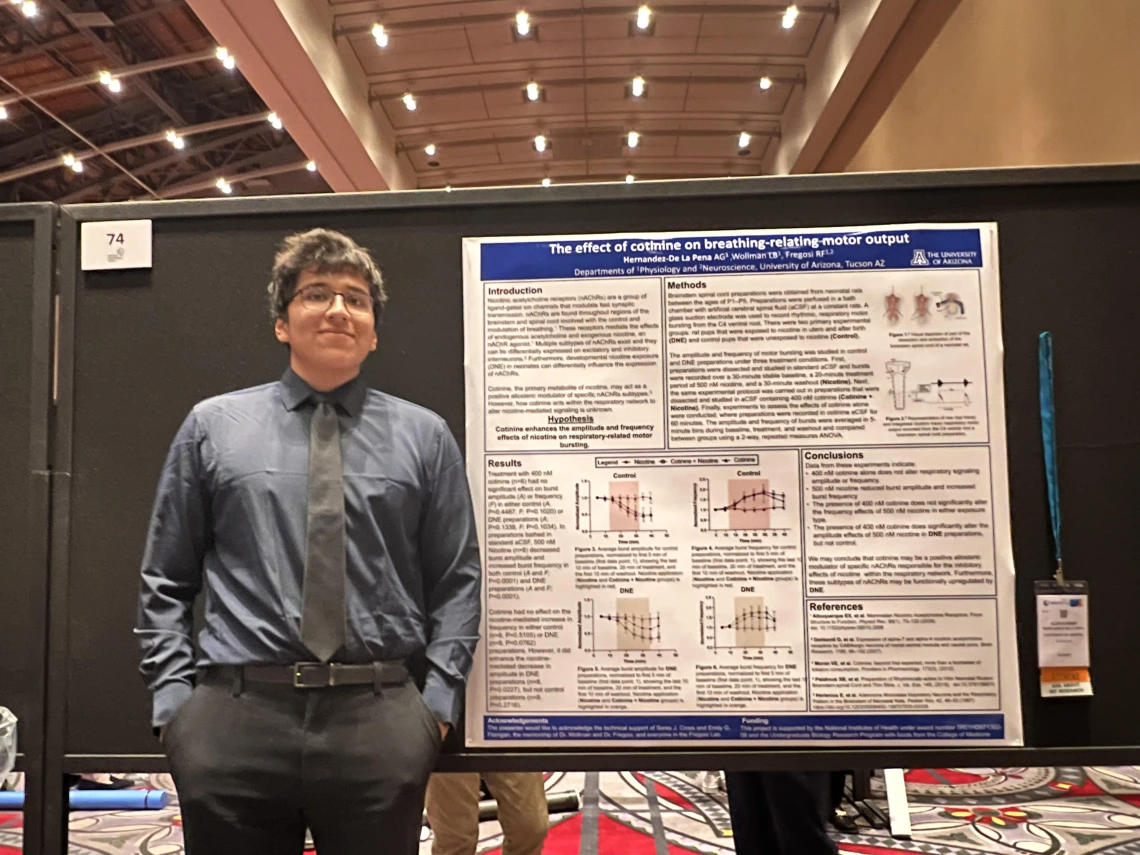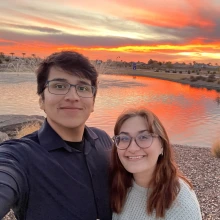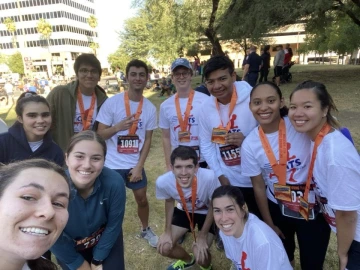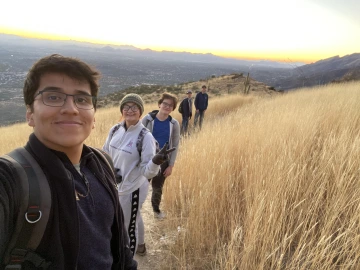Alumni Spotlight: Alessandro Hernandez-De La Pena '22


Alessandro (Gio) is a recent graduate from the University of Arizona's BS in Pharmaceutical Sciences program and now works as a research associate in Dr. Sangeeta Dhawan's lab at City of Hope in Duarte, CA where he studies the role of epigenetic regulators in the development of pancreatic beta-cells and diabetes pathogenesis. After more than two years of working in this position, Alessandro is now planning to follow proudly in his wife's footsteps and pursue a doctoral degree of his own. He has gained admittance to multiple PhD programs in the Los Angeles area and plans to begin attending USC in August. Alessandro has also been selected for the GEM Employer Fellowship and will soon be doing a summer internship at Genentech in San Francisco. In his free time, Alessandro enjoys hiking, weightlifting, and video games.
Q & A
What inspired you to pursue a BSPS degree?
- I first enrolled at the University of Arizona for Fall of 2018, I did so as a Biochemistry student. The BSPS was a brand new major that year and I had not heard of it until I attended that year’s admitted students day. At the time, I was very interested in pursuing pharmacy school after graduating and the college’s info-session for their new undergraduate major caught my attention. After attending it, the program seemed like the perfect fit and I changed my enrollment. It boasted the most science courses of any major on campus--which benefitted me due to my proclivity and interest for science (and a lowered math requirement, which was preferable to me). It also had a direct link to the university’s pharmacy school, more relevant major-specific courses to my interests, and had attendance as its streamlined focus.
How did your BSPS degree prepare you for the challenges you face as a graduate student?
- The BSPS degree had a diverse and rigorous collection of science and major courses that I am confident have prepared me for the level of rigor I will encounter in my future graduate studies. One of my favorite courses from the major, scientific writing, is taken fairly early in the program during our sophomore year. It was very challenging and yet incredibly enriching. The course gave exposure to scientific literature and taught us how to read, digest, and synthesize important material with skills that I still utilize today in my job. Scientific literacy is critical in not only conducting novel research but also dissipating common misconceptions and misinformation.

Can you describe a particular project or research you’ve worked on that you found especially rewarding?
- During my undergraduate studies I first became involved in research by joining Dr. Ralph Fregosi’s neurophysiology lab. Here, we studied the effects of developmental nicotine exposure (DNE) on breathing-related motor output using a neonatal rat model. DNE is implicated in a variety of conditions, including sudden infant death syndrome (SIDS), and many other neurological disorders. Under the mentorship of Dr. Lila Wollman, a postdoctoral fellow in the lab at the time, I conducted a variety of experiments using brainstem spinal cord preparations from neonatal rats and comparing the response of nicotine-exposed and control rats to different concentrations of nicotine, cotinine, and other receptor agonists and antagonists. I generated promising data supporting the role of cotinine as a positive modulator of the effects of nicotine on motor neuron output.
If you could give one piece of advice to current students, what would it be?
- I would encourage all students to have an open mind during their undergraduate studies. I came into the program set on attending pharmacy school after graduation but came out instead with a passion for scientific research. If I had not sought opportunities to explore and confirm my interests, I would have never discovered my true calling. Along with that, I would also recommend students to gain as much extracurricular experience as possible through internships, volunteering, and employment opportunities—it is just as, if not more, important than the degree itself for gaining employment or enrollment to postbaccalaureate positions. I was able to find employment during my job search in less than a couple weeks and a handful of interviews, an achievement I credit to my high educational background, glowing recommendations, and strong history of experience.

What’s your dream job and what makes it so appealing?
- My transformative experiences in the Fregosi lab during my undergraduate studies, and my current work as a research associate in Dr. Sangeeta Dhawan’s diabetes and developmental biology lab at City of Hope, has confirmed to me my passion for scientific research. I have applied for different graduate PhD programs in the Los Angeles area at UCLA, USC, and Caltech and have gained admission to my top choice program at USC Programs in Biomedical and Biological Sciences (PIBBS). I plan to gain experience in new fields of research like oncology and immunology and eventually gain either an industry position or academic faculty position. Eventually, I also hope to have my own lab and mentor my own students and trainees. My dream job is to conduct scientific research in innovative fields to better understand biological development and pathogenesis. Knowledge is powerful, and I have no stronger desire than to expand the forefront of scientific understanding.

